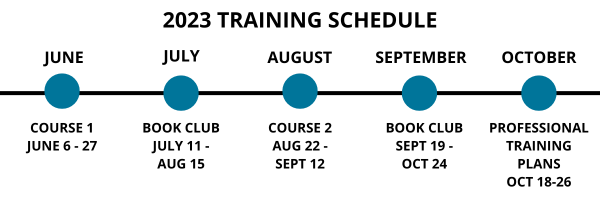A new interdisciplinary training series for child welfare professionals
June 6 – October 26, 2023
The Center for Advanced Studies in Child Welfare (CASCW) is working with CEED to offer an online interdisciplinary training series providing specialized training and mentorship to professionals working in the child welfare field.
Participant selection will be prioritized based on your current role in the child welfare field.
- The series uses a relationship-based training model.
- With a combination of monthly live discussions, reflective dialogue, and asynchronous learning, participants will engage in dynamic discussions with leaders and peers.
- Participants will also complete a personalized professional training plan.
- Participants who complete the training series will receive a certificate of completion and may opt to receive either 60 social work CEUs or 60 clock hours.
- Thanks to funding from CASCW, this training series will be offered for free.
Cohort tracks
The training series will feature two tracks for cohorts with different levels of education and/or experience. Applicants will be notified of their acceptance within one week of registering.
- A bachelor’s degree is required to participate in the frontline professional cohort.
- A master’s degree or supervisor-level position is required to participate in the supervisor cohort.
Frontline professional cohort
Typical roles include:
- Emergency responders
- Early childhood educators
- Public health or social services workers
- Court-appointed advocates
- Outreach specialists
- School social workers
Supervisor cohort
Typical roles include:
- Judicial counsels
- Care managers
- Leadership roles in early childhood education (e.g. program directors, supervisors)
- Agency directors
- Social workers
Training schedule
Introduction to Infant Mental Health and Reflective Practice will run June 6, 2023 through October 26, 2023. Subsequent sessions are planned. Sign up to be notified when applications open for our next cohort.
- Participants will alternate between completing online courses and joining in small group book club meetings to discuss a common text.
- The training series consists of 2 months of online courses and 2.5 months of book club meetings for a total duration of just under 5 months.
- The weekly time commitment is approximately 3 hours.

- Online course 1 runs June 6 to June 27
- Book club runs July 11 to August 15
- Online course 2 runs August 22 to September 12
- Book club runs September 19 to October 24
- Participants develop professional training plans October 18 to 26
Online courses
The online courses that are part of the training series are asynchronous, meaning that participants can access course materials 24/7 and complete them on their own schedule.
- One live online group discussion will be scheduled at the end of each course.
- Each course consists of 4 learning modules.
- Students are required to complete one module each week.
Book club meetings
Training series participants are responsible for purchasing The Emotional Life of the Toddler by Alicia F. Lieberman. Readings from the text will be assigned to discuss in weekly small group book club meetings.
The book club meetings provide:
- Experiential learning about reflective practice
- An opportunity for participants to build reflective capacity and define the scope of their work
- An understanding of the culture of the infant mental health field
- For the supervisor cohort, the book club meetings create a specialized port of entry to concepts that they can apply in their role
Learning objectives of the training series
- Develop a foundation for understanding the social and emotional needs of infants, toddlers, and preschoolers, including supporting optimal early brain development
- Understand and describe how infants and young children begin to develop self-regulation
- Learn a framework for understanding early development, including the transactional nature of relationships
- Understand the development of the attachment system in infants, toddlers, and preschoolers
- Understand and describe how caregivers and teachers can support a child’s development of self-regulation and executive function
- Understand how experiencing positive stress, tolerable stress, and toxic stress impact brain development
- Define and describe the infant mental health framework
- Develop a peer network of fellow practitioners
- Consider the role culture plays in your work
- Describe ways in which you use, or could use, an infant mental health framework in your work
- Gain an experiential understanding of reflective practice through small group meetings and peer conversations
- Co-create a space that models a “safe holding environment” for reflective thinking, connecting with peers, and capacity building using a reflective stance


